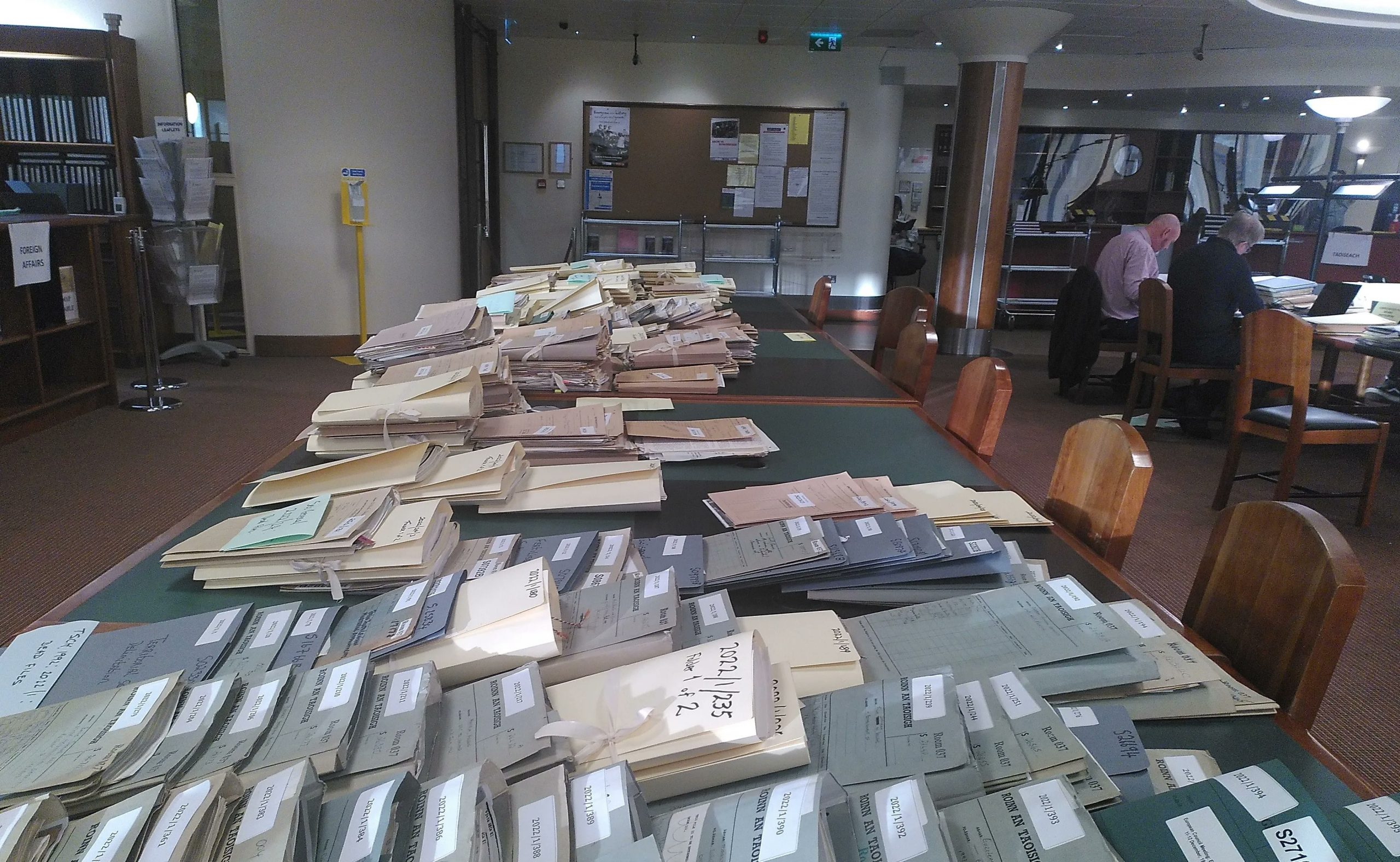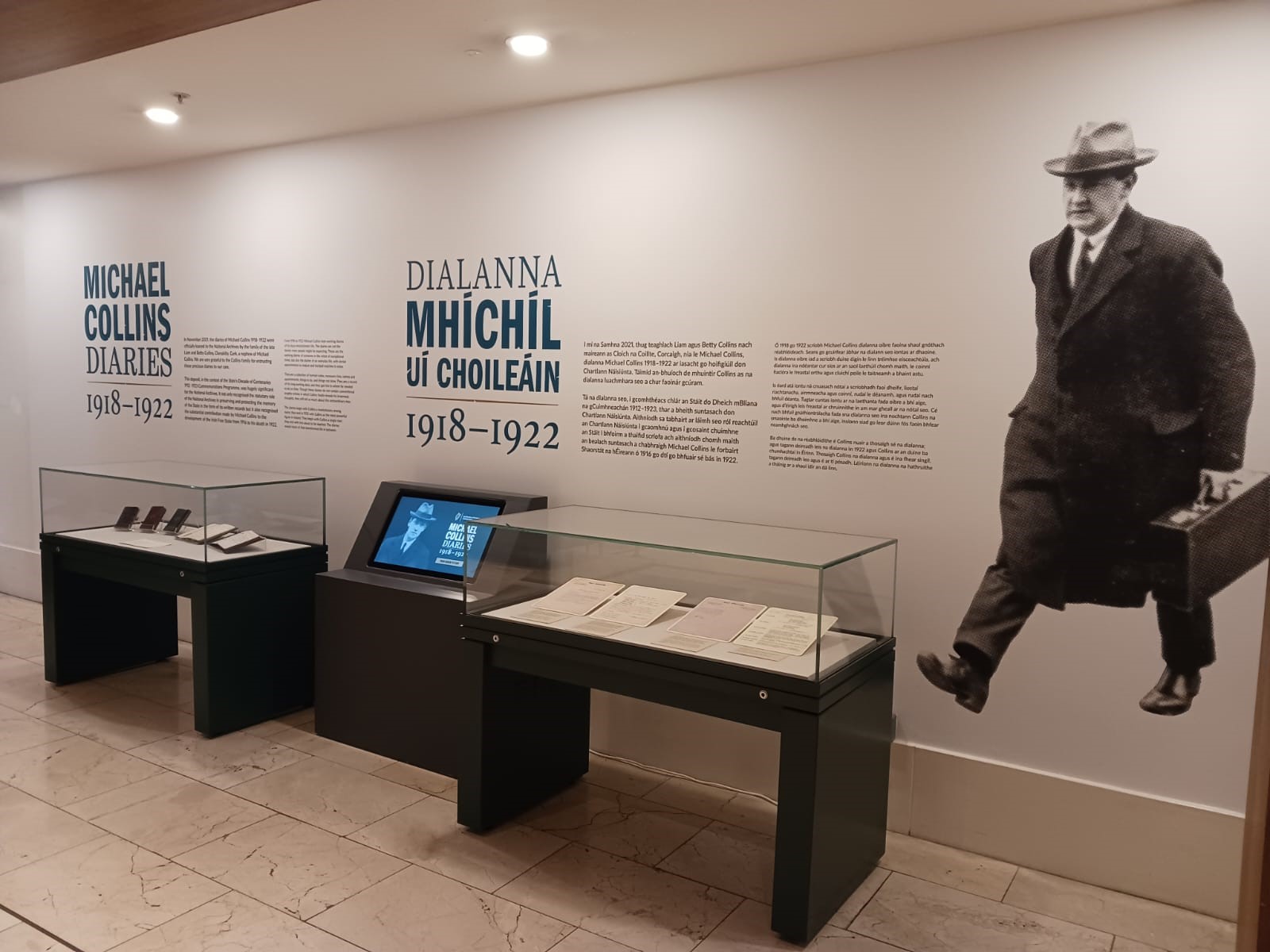Behind the Scenes
Behind the Scenes: The role of the NAI’s Current Records Unit in the archives of tomorrow

This week (7-11 June) is International Archives Week with the theme this year of empowering archives. The campaign focuses on how archives empower accountability and transparency, through access to information for holding governments to account and ensuring that citizens can protect their rights.
Niamh McDonnell, Head of the Current Records Unit in the Archives and Government Services division of the National Archives, explains below how records management in government determines the archives of tomorrow and how robust legislation underpins accountability.
Many people are accustomed with the public facing work of the National Archives, but are less familiar with what goes on behind the scenes and how records are transferred to the National Archives in the first place. The release of records to the public in the reading room is the last link in a long chain that begins within government departments and agencies with the creation of the records.
In my role as Head of the Current Records Unit within Archives and Government Services Division (AGS), my main area of responsibility is to appraise records to determine whether they hold archival value and should be transferred to the National Archives after 30 years, or whether they should be disposed of once their business function has ceased in accordance with section 7 of the National Archives Act, 1986. This work can be very varied, reflecting the wide range of roles and functions across the civil service, and involves travel to locations where records are stored, including government offices and commercial storage providers throughout the country. It is work that requires strong attention to detail and a broad understanding of the work of the civil and public service, as many records created across government are inter-connected in some way, which may not be obvious to those now working in a particular area. This may arise for a number of reasons, including the transfer of functions from one department to another or the practical implications of the implementation of a particular policy. This work also requires experience of how archives are used by researchers and, most importantly, very good inter-personal skills as we need to be able to talk to individuals at all levels about how and why they create records and how they are managed over time. It is an incredibly important part of the archival process and one that we take very seriously.
As part of the appraisal of records, particularly those where disposal authorisation is given, it is important to create an audit trail of the entire process in order to justify the decision and to ensure that all aspects of the process uphold the principles of transparency and accountability. This involves a survey of the records and the writing of a report which is presented to the Director of the National Archives. Any final decision on the disposal of departmental records rests with the Director in her role as a statutory office holder. It is my job to make sure that the Director is fully informed of the background to the records, the functions they support and any other relevant details, which can often entail quite a lot of research or conversations with colleagues in departments and agencies who have created or manage the records. I’m frequently asked how you determine which records hold historical value. This is often impossible to answer as historical value is subjective and can change over time. When appraising records of government we use the underlying function of the records as the basis for how significant they are likely to be, while recognising that there will always be exceptions to any rule. Records across government are not created to fulfil an archival function, but to support a business function. Some functions such as policy development will create records, a substantial amount of which will hold archival value, while supporting administration or processing activities are likely to generate a higher percentage of records to be destroyed. Where records are identified for transfer to the National Archives, my colleagues in the Archives Management Unit of AGS take over and manage the process of transfer, cataloguing and making records available to researchers.
As civil servants we are governed by various legal frameworks. For departments or agencies, they will have legislation establishing their organisation and setting out their core functions, and may also be subject to other legislation depending on their area of work. This may be legislation applicable across the entire civil and public service, such as Data Protection or Freedom of Information Acts, or they may also have to comply with European legislation. For us in the National Archives, our establishing legislation is the National Archives Act, 1986, but we must also comply with our obligations under the Freedom of Information Act, 2014 and Data Protection Act, 2018.
Not all records created by the civil and public service should be retained permanently. On a practical level, it would be impossible to continue to accrue records from a storage point of view for both paper and digital records. From a legal perspective, it also places the State at risk, as it will not be complying with other legal obligations such as the retention of records containing personal data where derogation’s allowed for under article 89 of GDPR for archiving purposes in the public interest do not apply. A large part of my role over the past number of years has been to give guidance on records management issues. This has been particularly important since the enactment of GDPR and increased awareness of the risk posed to the unnecessary retention of certain classes of records.
There has been a lot of misinformation about how records containing personal data should be managed. Derogation’s for archiving purposes in the public interest, historical, statistical and scientific research were included in GDPR to reflect the fact that many records would become worthless if wholesale destruction were allowed based on no other reason other than they contained personal data, and without any consideration of the broader context in which the records were created. There is no such thing as a data protection issue, but an information management issue. Where information is managed in a coordinated way there should be little or no risk to an organisation, as the organisation will know what records they hold, on what legal basis they hold them and for how long they should be retained. These principles apply to any organisation regardless of whether they work within government or not. This life-cycle approach to information management ensures that records worthy of permanent preservation as archives are identified and protected to ensure they are transferred to the National Archives. It allows for resources to be put in place to ensure both paper and digital records are managed over time, and remain secure and accessible. It also ensures the organisation can identify records required in the event of a request under Freedom of Information legislation or a subject access request under Data Protection legislation in order to uphold the rights of citizens.
At present, the National Archives has no statutory role in records management within the civil and public service. This means that although we can give guidance, this does not need to be followed, with the result that many inconsistent practices have developed over time. This places the archival record at risk.
It has been 35 years since the National Archives Act, 1986 was introduced. Although this is a fundamentally sound piece of archival legislation, it does require review to take account of many of the developments that have happened in Irish society in the intervening years. Although the Act applies to both paper and digital records, it limits the scope by which the National Archives can intervene before records are 30 years old. At present, only Section 7 allows for early intervention where an application for disposal has been received. Without some oversight in how digital records are managed, it is inevitable that there will be gaps in the historical record. The Act pre-dates both the Freedom of Information and Data Protection legislation. It also lists specific bodies in the schedule to which the Act applies, many of which no longer exist, with the result that many bodies created since 1986 have no legal protection for their records. The civil and public service has expanded dramatically over the past 25 years to reflect broader changes in Irish society. Archival legislation has not kept up with these developments.
On Thursday 24th of June, the National Archives will host a seminar to begin discussion and interrogation of many of these critical issues in the context of wider international practice. Our speakers from Scotland, Denmark and New Zealand, all countries with a similar population to Ireland, will provide a really useful insight into the role their National Archives play in archives and information management within their public and civil services, and how they have dealt with the advent of technology and issues of data governance and access by placing their institutions at the centre of the debate. See below for further information on how to book.
Seminar: ‘Protecting the public record: models of international best practice’ June 24
Niamh McDonnell, Senior Archivist, Archives and Government Services Division


